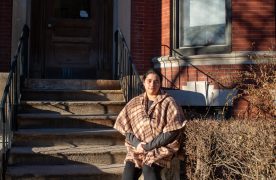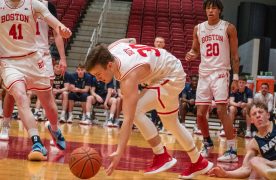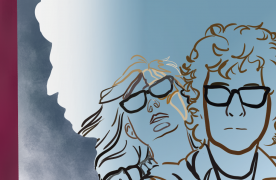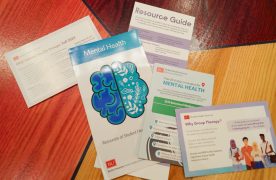When Brendan Little worked as policy director for the City of Boston’s Office of Recovery Services, he often received requests from constituents to help pay for their loved ones’ funerals, but the office did not have the dedicated funds to support them.
Little, who is in long-term recovery from a substance abuse disorder, dropped out of high school and later earned his GED. He recalled mailing his college application, only to realize he couldn’t afford the $200 processing fee.
“I remember just feeling really ashamed and sad and stressed,” Little said. “That $200, at that point, wasn’t just an amount of money I needed. It was my self-worth.”

Now, Little is the co-founder and co-director of Healing After Loss to Overdose Initiatives, which officially launched in January, with the help of Co-Founder Elsa Gomes Bondlow.
HALO debuted its first fund with the City Jan. 29 — the Family Overdose Support Fund.
The fund will provide up to $5,000 to Boston families who lost an immediate family member to opioid overdose within the last two years. The funds can support expenses like funerals, behavioral health, child wellness and legal costs related to the death of loved ones, Little said.
“Nobody’s ever done this before in the country. It’s the first of its kind, using opioid dollars in this way,” Little said. “If other cities or towns or other states are interested in partnering with us, we’re eager to do that.”
Granted $250,000 from the City for the first year, HALO Initiatives hopes to serve at least 50 families in 2025, Little said.
“It’s not just money we’re talking about, but it’s money that is a testament of somebody’s worth, and the money is a testament that somebody is worthy of health and worthy of survival and worthy of healing,” Little said.
The fund was created following a report by the City that revealed a significant decline in opioid overdose deaths from May to August 2024 compared to the same period in 2023. This decrease was most prominent in Black and Latino residents, who saw a 56% and 28% decline, respectively.
Big Cities Health Coalition, a group consisting of leaders from the largest city health departments in the U.S., works on overdose response and health equity.
BCHC Communications Director Elizabeth Green said many cities across the country have also seen a decline in overdose deaths. Still, most areas still have a disproportionate impact on Latino and Black communities.
This imbalance traces back to overprescription of opioids in mainly rural, white communities that shifted into the cities in the last few years, according to a September 2024 study by Johns Hopkins University.
When overprescription was shut down, Green said those who were already addicted needed another drug to stimulate them, so the opioid market developed and soon spread into Black and Latino communities — further aggravated by the introduction of fentanyl.
Green said health officials often suggest being “cautiously optimistic about the numbers,” as factors, such as new drugs in the market, could cause another spike in overdose deaths.
“There are constantly new drugs entering the market. Some of them [are] lethal, even in small doses like fentanyl,” Green said. “I don’t think anybody’s sanguine about, ‘Oh, yeah. We’ve definitely conquered this, and we’re going to knock this out entirely in a year or two.’”
District 2 City Councilor Ed Flynn said it is important to note older Black men in Boston have been disproportionately affected by the opioid epidemic. Between 2017 to 2023, fatal overdoses among Black men over 55 surged by 242%, even as overdose rates among men of all races declined, according to the Boston Globe.
“Many Black men in addiction recovery programs in Boston said they feel unwelcome in programs that are largely designed by others and are not all that inclusive,” Flynn said.
Flynn said the citywide opioid crisis is “significant and dramatic,” and he has seen open drug use and drug dealing in his neighborhood near Andrew Square.
“We need to provide people with drug treatment programs, but we also need to address the open drug dealing and drug use happening throughout the city,” Flynn said.
Green said the BCHC applauds Boston for the Family Overdose Support Fund, calling it an innovative strategy for intervening in the city’s opioid crisis.
She also said she appreciates that the fund’s approach addresses overdose death as a health issue and not a law enforcement issue. Investing only in treatment and law enforcement is dealing with the problem “at its end point” and not at its root, Green said.
“I really appreciate their both data-driven and compassionate effort to really try to make those families as whole as possible,” Green said.
Flynn said he thinks the fund is “a first start,” but getting people into drug treatment and detox programs should be the City’s priority.
“We have to support those with substance abuse challenges, and detox is the first step,” Flynn said. “We must ensure those beds are open and available for people willing to seek treatment.”
Sarah Voorhees, assistant director of Substance Use, Recovery & Sexual Wellbeing at Boston University Student Health Services, wrote in an email to The Daily Free Press that it is important for the BU community “to engage in learning that make BU and Boston a safer place.”
“Over the past many years I’ve heard from more and more students who want to ensure naloxone and harm reduction information and resources are available in the BU community,” Voorhees wrote.
SHS has overdose prevention training teaching attendees how to identify an overdose, administer nasal naloxone and perform rescue breathing, Voorhees wrote.
Little said he hopes the fund starts by relieving stress for families of overdose victims, but that in the long term it “disrupts the cycle of trauma” and its effects when someone dies from an overdose.
He said his experience with substance abuse informs the work he does.
“It’s integral to who I am, and when we’re helping people with these financial burdens, that’s stuff that I’ve struggled with,” Little said. “I’ve struggled to figure out how to pay for school. I’ve struggled with how to figure out how to pay for somebody’s funeral that I love that died, so it’s really personal to me.”














